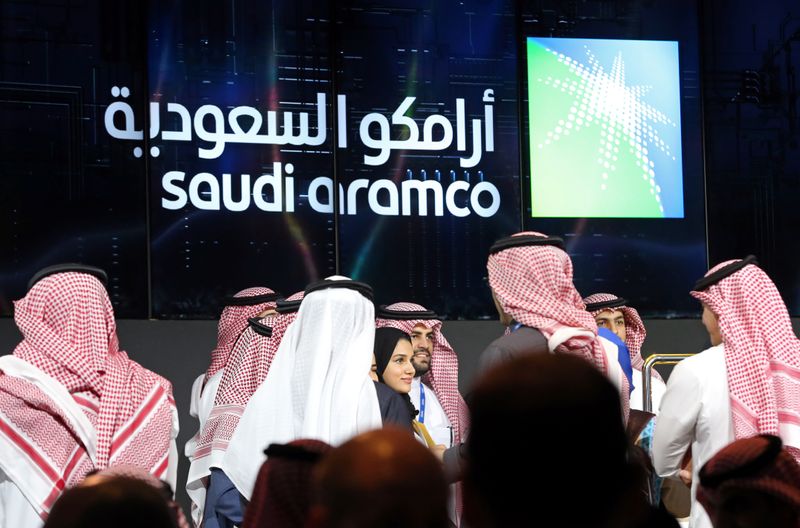By Davide Barbuscia and Marwa Rashad
RIYADH (Reuters) - Saudi Aramco's listing will boost the kingdom's efforts to diversify from oil as the bulk of proceeds will be injected in domestic projects, while the global buzz surrounding the deal will help lure foreign capital, the finance minister said.
Aramco's (SE:2222) shares surged the maximum permitted 10% on their Riyadh stock market debut on Wednesday, following the state-controlled oil giant's record $25.6 billion initial public offering (IPO).
However, the listing has fallen short of Crown Prince Mohammed bin Salman's initial hopes for a larger flotation on a international exchange.
Funds from the 1.5% stake sale, more than 80% of which was bought by Saudi buyers, will go to the Public Investment Fund (PIF), the sovereign wealth fund tasked with delivering Prince Mohammed's ambitious economic transformation drive to wean the world's top oil exporter off crude revenues.
"The proceeds will be used largely, maybe not totally, in the local economy, in projects where the PIF will be the first mover which then basically pulls more private sector participation ... so the money will remain in the system mostly," Finance Minister Mohammed al-Jadaan told Reuters.
Riyadh scrapped a planned international roadshow after foreign investors questioned the valuation sought for Aramco and raised concerns about corporate transparency.
Instead, the government focused on marketing the listing to Saudi investors and wealthy Gulf Arab allies.
Jadaan said the fact that one third of the share sale was covered by individual Saudis was positive for "wealth retention and savings", and that key IPO buyers were Saudi investors who would normally keep money outside the kingdom.
The listing should in the long term help deepen Saudi capital markets and lure foreign investment, Jadaan said.
"An asset of this quality attracts a lot of attention, when you attract attention to this company you then attract attention to other assets in the country that would not have been otherwise attractive in their own to international investors."
FISCAL REFORMS
Jadaan was speaking after the Saudi government released a 2020 budget forecasting slightly lower expenditure and a wider deficit as the kingdom tries to balance fiscal prudence with continued support for the economy.
Jadaan said the impact of the Aramco share sale on the Saudi fiscal position would take time.
"Whether the PIF receives $100 billion or $25 billion, they will need time to deploy that money," he said.
The minister said Riyadh planned to proceed with deeper cuts to energy subsidies between 2020 and 2025 but that the government would assess the impact on private sector growth before deciding on the size of cuts and timing.
"We're looking specifically at the industrial sector and how we’re going to ensure that any energy price reform does not cause them damage, so we're looking at it and considering it."

The Saudi economy grew 0.4% this year, according to official estimates, as the kingdom cut its crude production under a global supply reduction agreement. The government expects growth of 2.3% next year, supported by non-oil sectors.